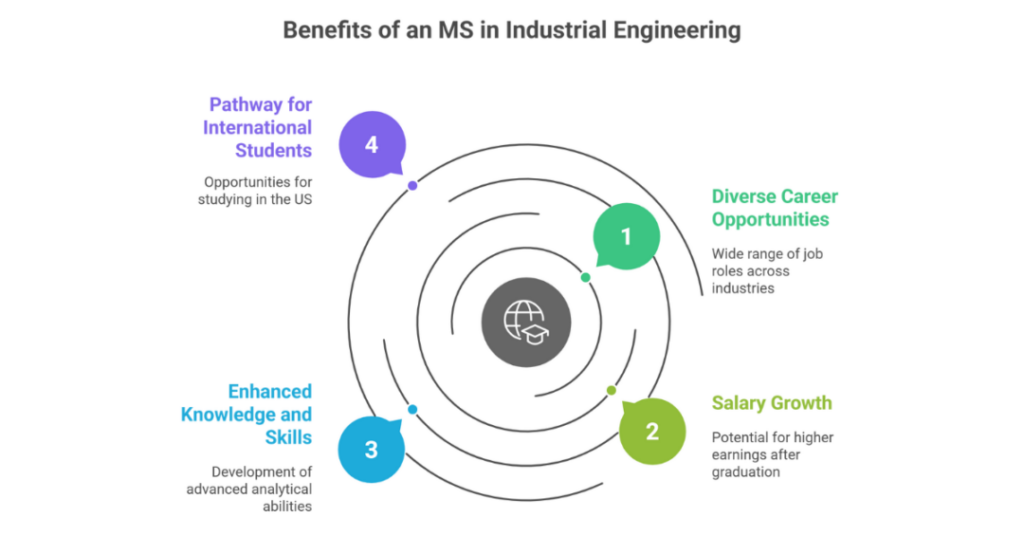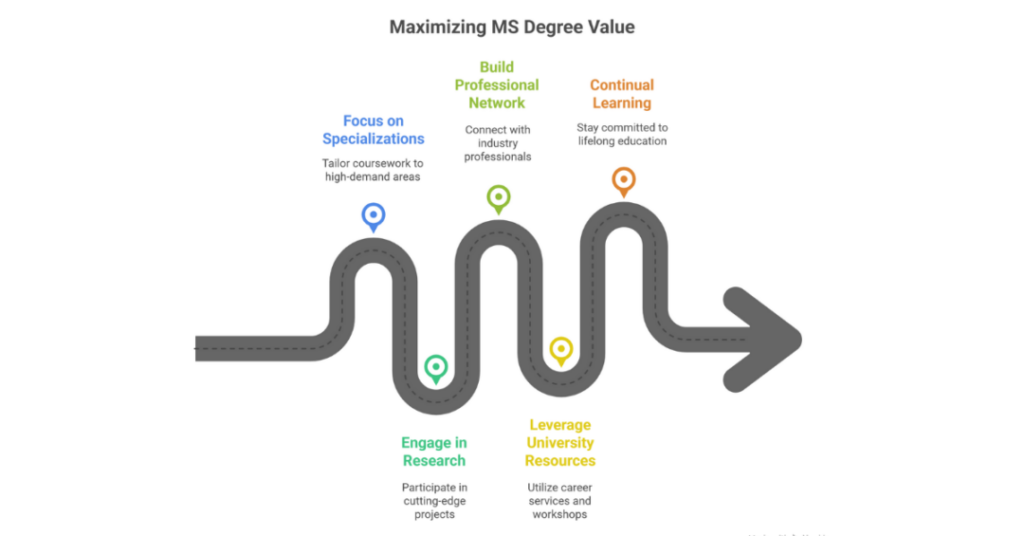3 September 2025
6 minutes read
MS in Industrial Engineering in USA Salary: A Complete Guide for Indian Students

Key Takeaways
- MS in Industrial Engineering in USA salary averages $75,000–$85,000 annually, with top programs pushing beyond $100,000.
- Choosing the right university, such as MIT, Stanford, or Georgia Tech, directly boosts ROI, industry connections, and career prospects.
- To maximize degree value, specialize in high-demand fields, build networks, and pursue certifications for long-term career growth.
Did you know that graduates with a Master’s in Industrial Engineering from top U.S. universities can command starting salaries well above $80,000? For many, it’s a staggering payoff that makes the intense years of study worth every minute. But here’s the catch—not all programs deliver the same return on investment, and choosing the wrong university can leave you with a hefty student loan and a less-than-impressive salary.
The truth is, finding the right program can be daunting. It’s not just about prestige; you want a university that consistently produces high-earning graduates and has strong industry connections. Many students dive into programs with big promises, only to graduate into lower-paying jobs that don’t justify the cost of their degree. So, how do you avoid this? The good news is that we’ve done the legwork to identify the top 10 U.S. universities where MS in Industrial Engineering graduates earn high salaries, setting you up for the career (and paycheck) you’re aiming for.
Why Pursue an MS in Industrial Engineering?
Industrial engineers (IE) are trained to transform complexity into efficiency. If you’ve ever thought about how a mechanical engineer or employee in a factory can develop smarter systems under supervision, this field shows the way.

Whether you hold a bachelor’s or are already pursuing a master’s, an engineering master’s degree in industrial engineering can open doors to some of the best engineering roles across industries.
Diverse Career Opportunities
Graduates with a degree in engineering, particularly those who complete a specialized field of study like IE, have diverse options. From transportation and retail to infrastructure and healthcare, industrial engineers emerge in every sector. With the right qualifications for industrial roles, you can land a job title that brings real satisfaction and the chance to strive for leadership positions.
Salary Growth and Pay Range
The median salary for industrial engineers in the USA was strong even in 2020, with professionals earning annually between the minimum and maximum pay range set by industry standards. After the completion of an MS, you can expect a higher estimate of earnings. According to statistics, those with an advanced science degree or a degree in the United States often command better compensation than those without.
Enhanced Knowledge and Skills
A master’s program in IE isn’t just about getting the right degree; it’s about building advanced analytical abilities. With mandatory coursework in operations research, supply chain management, and optimization, students complete about 30–36 credit hours over 2 years. US universities design these programs so grad students can prepare for engineering jobs that demand problem-solving and innovation.
Pathway for International Students
For an international student, especially students from India, earning a degree in the United States in industrial engineering offers unmatched benefits. Not only can you qualify for a student visa, but you also gain access to top us universities with cutting-edge labs and industry connections. The process is straightforward: research schools, check tuition and expense requirements, submit your application, and take a look at support resources to help you succeed.
What Is The Average Salary for MS in Industrial Engineering Graduates
On average, MS in Industrial Engineering graduates in the U.S. start with a salary around $75,000 to $85,000 per year, with top-tier roles easily crossing the $100,000 mark. These numbers aren’t just wishful thinking; they reflect the demand for professionals who can optimize complex systems in manufacturing, logistics, healthcare, and more.
However, these averages vary widely based on the school, location, and the industries hiring. Graduates from highly-ranked programs often secure higher starting salaries, while those from less-recognized institutions may face a different reality. So, if a strong return on investment is important to you, it pays literally to know which programs lead to the highest-paying jobs in industrial engineering.
| Experience Level | Average Salary (per year) | Notes |
|---|---|---|
| Entry-Level (0-2 years) | $70,000 – $80,000 | Higher than bachelor’s degree holders |
| Mid-Level (3-5 years) | $85,000 – $95,000 | Increases with experience and additional certifications |
| Senior-Level (6+ years) | $100,000 – $120,000 | Can exceed this range with management or specialized roles |
Other Factors That Can Influence Your Salary
Navigating the landscape of industrial engineering salaries in the USA reveals a complex interplay of factors. Understanding these variables is crucial for both aspiring and current industrial engineers aiming to maximize their earning potential. By grasping these factors, professionals can strategically position themselves within the industry to achieve optimal financial rewards.
- Geographic Location: Salaries for industrial engineers vary widely across different regions in the USA, primarily due to the cost of living and industrial demand in specific areas.
- Years of Experience: More experienced industrial engineers typically command higher salaries, reflecting their accumulated expertise and contributions to the field.
- Industry Sector: The sector in which an industrial engineer works significantly influences salary. High-tech industries, healthcare, and logistics often offer higher pay than traditional manufacturing due to the complexity and value of the work.
- Education Level: Holding an MS in Industrial Engineering usually results in a higher starting salary compared to those with only a bachelor’s degree, due to the advanced knowledge and skills acquired.
- Certifications: Professional certifications such as Lean Six Sigma, PMP (Project Management Professional), or CPE (Certified Professional Engineer) can further boost an engineer’s salary by demonstrating specialized competencies.
- Company Size and Type: Larger corporations or multinational companies tend to offer higher salaries and more comprehensive benefits packages compared to smaller firms or startups, reflecting the scale and scope of the projects undertaken.
The Value of an MS Degree in the Job Market
In an ever-evolving industrial landscape, the pursuit of an MS in Industrial Engineering offers a strategic advantage in the competitive job market. We’ll highlight the tangible and intangible benefits of holding an MS degree, underscoring its significance as a catalyst for career advancement in the field of industrial engineering.
- Enhanced Job Opportunities: An MS degree opens doors to advanced positions that are not accessible to those with a bachelor’s degree alone, including managerial and specialized technical roles.
- Higher Salary Potential: Graduates with an MS in Industrial Engineering typically enjoy higher starting salaries and greater salary growth over their careers.
- Improved Job Security: Advanced education often correlates with improved job stability, as employers value the specialized skills and knowledge that MS degree holders bring to the workforce.
- Global Competitiveness: Holding an MS degree from a reputable institution in the USA makes candidates more competitive in the international job market, enhancing employment opportunities abroad.
- Professional Development: An MS degree provides a platform for ongoing learning and professional development, enabling industrial engineers to stay abreast of technological advancements and industry trends.
10 Top Universities To Study MS In Industrial Engineering In USA For High Salary
Choosing the right university can make a significant difference, not only in educational quality but also in starting salary. Here’s a curated list of top U.S. universities that are leading in QS rankings and consistently help graduates achieve impressive starting salaries.
| University | Average Annual Fees | Average Starting Salary |
|---|---|---|
| Massachusetts Institute of Technology (MIT) | $53,790 | $100,000+ |
| Stanford University | $57,861 | $95,000+ |
| University of California, Berkeley | $44,008 | $90,000+ |
| University of Michigan, Dearborn | $52,456 | $88,000+ |
| Georgia Institute of Technology | $29,140 (in-state) | $85,000+ |
| University of Illinois, Springfield | $34,330 | $80,000+ |
| Purdue University | $28,794 | $82,000+ |
| University of Southern California (USC) | $63,468 | $86,000+ |
| Texas A&M University | $30,083 | $99,000+ |
| University of Washington, Seattle | $32,588 | $132,000+ |
How To Get Most From Your MS Degree?
Achieving an MS in Industrial Engineering is just the beginning of a journey toward career excellence and fulfillment. Maximizing the value of this advanced degree requires strategic actions and decisions.

These insights aim to guide graduates toward realizing the full spectrum of benefits their degree offers in the professional realm.
- Focus on Specializations: Tailor your coursework and research to specialize in high-demand areas such as supply chain management, operations research, or healthcare systems engineering.
- Engage in Research and Projects: Participate in cutting-edge research projects and practical internships to gain hands-on experience and make valuable industry connections.
- Build a Professional Network: Utilize university alumni, professional organizations, and conferences to build relationships with industry professionals and potential employers.
- Leverage University Resources: Take advantage of career services, workshops, and seminars offered by the university to enhance your employability and job search strategies.
- Continual Learning: Stay committed to lifelong learning through professional development courses, certifications, and seminars to keep your skills relevant and enhance your career progression.
Conclusion
An MS in Industrial Engineering in the USA is more than just an academic achievement; it’s a step towards securing a rewarding career with substantial financial benefits. By understanding the salary landscape, recognizing the value of the degree in the job market, and strategically navigating the educational journey,
Transform your academic aspirations into reality with Ambitio Elite. Immerse yourself in personalized guidance, AI Copilot support, and expert mentorship. Commence your journey today! Explore Ambitio Elite
FAQs
What is the ROI of an MS in Industrial Engineering in the USA?
The ROI is generally high, as graduates can secure well-paying jobs in diverse industries. The investment in tuition is often recouped within a few years of employment due to the higher salary brackets for MS holders.
Are scholarships available for international students pursuing an MS in Industrial Engineering?
Yes, many universities offer scholarships, assistantships, and fellowships specifically for international students. It’s crucial to check with the specific institution for available financial aid options.
How does location affect the salary of industrial engineers in the USA?
Salaries can vary significantly based on the cost of living and industrial demand in different states and cities. Typically, urban areas with a high concentration of industries offer higher salaries.
Can I work in the USA after completing my MS in Industrial Engineering as an international student?
Yes, international students can apply for Optional Practical Training (OPT) to work in the USA for up to 12 months after graduation, with a possible extension for STEM graduates.
What are the career prospects for MS in Industrial Engineering graduates?
Graduates can pursue careers in various sectors such as manufacturing, healthcare, logistics, and consulting, with roles in operations management, process improvement, project management, and supply chain optimization.

You can study at top universities worldwide!
Get expert tips and tricks to get into top universities with a free expert session.
Book Your Free 30-Minute Session Now! Book a call now




























